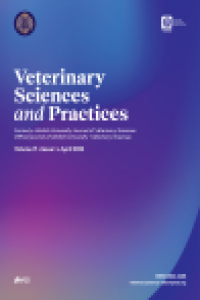Sığırlarda Güç Doğum ile İlişkili Buzağı Metakarpal Kırıkları: Buzağılar Arasından Olgu Serisi
Büyükbaş hayvancılık işletmelerinde, doğum sırasında aşırı çekme ve/veya yanlış uygulamalar sonucunda matakarpal kırıklara rastlanmaktadır. Bu çalışmanın amacı, farklı uygulamalara ve kemiğin biyofiziksel risk faktörlerine göre buzağılarda metakarpal kırıkların klinik özelliklerinin sunulmasıdır. Ocak 2006 ile Ocak 2013 arasında metacarpus kırığı olan buzağıların medikal kayıtları değerlendirildi. Klinik ve radyografik muayeneler sonrasında kırıkların tipleri ve lokalizasyonu kayıt altına alındı. Buzağıların bireysel koşulları ve sahibinin tutumu ile ilişkili olarak tedavi prosedürleri uygulandı. Güç doğum sonucu 32 adet Holstein-Friesian ırkı buzağıda oluşan metacarpal kırık incelendi. Tüm kırıklar halatın uygulandığı bölgenin etrafında görüldü. Kırıkların büyük bir bölümü [32 vakanın 22’si (%68.75)] kemiğin distal 1/3’ünde (distal %33.3) gözlendi. Toplamda 19 oblik, 10 transversal, 3 transversal parçalı kırık tespit edildi. Aynı zamanda deride yumuşak doku lezyonları (ödem, subkutaneöz ve/veya peteşiyal hemorajier) kayıt altına alındı. Fetal ekstraksiyon araçlarının tasarımını ve ekstraksiyon için alternatif uygulamaları geliştirerek, gelecekte bu komplikasyonun insidansı azaltılabilir.
Anahtar Kelimeler:
Buzağı, Doğuma yardım, Güç doğum, Metakarpal kırık
Calf Metacarpal Fractures in Association with Bovine Dystocia: Case Series Among Calves
Metacarpal fractures related to excessive and/or inaccurately traction during delivery has been encountered in large animal livestock. The purpose of this study is presented of clinical features of metacarpal fractures in calves by regarding different applications and bone’s biophysical risk factors. Medical records of metacarpal fractured calves between January 2006 and January 2013 were evaluated. After clinical and radiographically examinations, the types and localization of fractures were recorded. Regarding to the individual condition of calves and also attitude of owner, several treatment procedures were performed. Thirty-two metacarpal fractures in Holstein-Friesian calves related to extraction force were studied. All fractures were observed around that the place of the rope application. Most of the fractures [22 of 32 cases (68.75%)] were located distal 1/3 part (distal 33.3%) of the bone. Total 19 oblique, 10 transversal, 3 transversal comminuted fractures were determined. Soft tissue lesions (edema, subcutaneous and/or petechial hemorrhage) on the skin recorded concomitantly. By improving the design of fetal extraction tools and alternative applications for extraction, incidence of this complication may be reduced in the future.
Keywords:
Assisting calving, Calf, Dystocia, Metacarpal fracture,
___
- 1. St Jean G., Anderson DE., 2014. Decision Analysis for Fracture Management in Cattle. Vet Clin Food Anim 30, 1-10.
- 2. Yamagishi N., Devkota B., Takahashi M., 2014. Outpatient treatment for humeral fractures in five calves. J Vet Med Sci, 76, 1519-1522.
- 3. Marchionatti E., Fecteau G., Desrochers A., 2014. Traumatic Conditions of the Coxofemoral Joint: Luxation, Femoral Head-Neck Fracture, Acetabular Fracture. Vet Clin Food Anim, 30, 247-264.
- 4. Mulon PY., Desrochers A., 2014. Indications and Limitations of Splints and Casts. Vet Clin Food Anim, 30, 55-76. 5. Baird AN., Adams SB., 2014. Use of the thomas splint and cast combination, walker splint, and spica bandage with an over the shoulder splint for the treatment of fractures of the upper limbs in cattle. Vet Clin Food Anim, 30, 77-90. 6. Nuss K., 2014. Plates, pins, and interlocking nails. Vet Clin Food Anim, 30, 91-126.
- 7. Vogel SR., Anderson DE., 2014. External skeletal fixation of fractures in Cattle. Vet Clin Food Anim, 30, 127-142.
- 8. Abdela N., Ahmed WM., 2016. Risk factors and economic impact of dystocia in dairy cows: A systematic review. J Reprod Infertility 7, 63-74.
- 9. Dematawewa CMB., Berger PJ., 1997. Effect of dystocia on yield, fertility, and cow losses and an economic evaluation of dystocia scores for Holsteins. J Dairy Sci, 80, 754-761.
- 10. Barrier AC., Ruelle E., Haskell MJ., Dwyer CM., 2012. Effect of a difficult calving on the vigour of the calf, the onset of maternal behaviour, and some behavioural indicators of pain in the dam. Prev Vet Med, 103, 248-256.
- 11. Murray CF., Leslie KE., 2013. Newborn calf vitality: Risk factors, characteristics, assessment, resulting outcomes and strategies for improvement. Vet J, 198, 322-328.
- 12. Aksoy O., Ozaydin I., Kilic E., Ozturk S., Gungor E., Kurt B., Oral H., 2009. Evaluation of fractures in calves due to forced extraction during dystocia: 27 cases (2003-2008). Kafkas Univ Vet Fak Derg, 15, 339-344.
- 13. Arican M., Erol H., Esin E., Parlak K., 2014. A retrospective study of fractures in neonatal calves: 181 Cases (2002-2012). Pak Vet J, 34, 247-250.
- 14. Akın I., 2014. Comparison of the mid-shaft bone geometry between fractured and non fractured femora in newborn calves. Acta Sci Vet, 42, 1-6.
- 15. Bilgili H., Kurum B., Olcay B., 1999. Researches on treatment options for long bone fractures in calves by Ilizarov technique. Ankara Univ Vet Fak Derg, 46, 299-308.
- 16. Gorgul OS., Seyrek-Intas D., Celimli N., Cecen G., Salci H., Akin I., 2004. Evaluation of fractures in calves: 31 cases (1996-2003). Vet Cer Derg, 10, 16-20.
- 17. Yanmaz LM., Kaya M., Dogan E, Okumus Z., 2014. Sığır ve buzağılardaki kırık olgularının değerlendirilmesi. Van Vet J 25, 23-26.
- 18. Norman S., Youngquist RS., 2007. Parturition and Dystocia. In “Current Therapy in Large Animal Theriogenology”, Ed., RS Youngquist and WR Threlfall, 2nd ed, 310-335, Elsevier, St. Louis.
- 19. Anderson DE., Desrochers A., 2004. Surgery of the Bovine Musculoskeletal System. In “Farm Animal Surgery”, Ed., S Fubini and NG Ducharme, 1st ed, 283-350, Elsevier, USA.
- 20. Sevil F., Ocal MK., 2006. Cross-sectional geometry of the metapodial bones in the calf and ox. Dtsch Tierarztl Wochenschr, 113, 423-428.
- Başlangıç: 2022
- Yayıncı: Atatürk Üniversitesi
